REVIEW
Pacific Chorale, Renée and Henry Segerstrom Concert Hall, Costa Mesa
DAVID J BROWN
… but not literally “friends” of course: Frank Ticheli, the eldest amongst the three American composers and one British represented in the first half of the Pacific Chorale’s final concert in its 2021-22 season, was born in 1958, the same year that Ralph Vaughan Williams died, but nonetheless there were enough correspondences of style and sensibility between RVW’s music and theirs, as heard on the first Saturday in May, for him surely to have recognized and welcomed their 21st century upholding and continuation of the choral tradition in which he was a central 20th century figure.
%20composers%20Jake%20Runestad,%20Frank%20Ticheli,%20and%20Tarik%20O%E2%80%99Regan;%20poet_lyricist%20Marcus%20Omari-1459.jpeg) |
| l-r:Composers Jake Runestad, Frank Ticheli, and Tarik O'Regan, and poet Marcus Omari. |
The closest correspondence, perhaps surprisingly, was with the youngest composer present, Jake Runestad (b. 1986), and via a visionary creative figure from America’s literary past whose presence also infused this event. RVW was just one of many British composers who set the poetry of Walt Whitman to music, and his Dona Nobis Pacem (1936), which filled the second half of the concert and in which three of the six movements are Whitman settings drawn from various places in Leaves of Grass, was arguably his greatest work to do so.
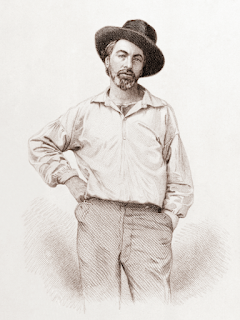 |
| Steel engraving of Walt Whitman in 1855, the year of Leaves of Grass first publication. |
With the Pacific Symphony Orchestra limited here to just trumpets, trombones, percussion, harp and strings, Proud Music of the Storm’s bold and brassy opening, straightforwardly diatonic style, and clearly projected word-setting made it an obvious crowd-pleaser, with more than a touch of Hollywood feel-good and in its quiet central section one particular recurring harmonic sequence that for this listener irresistibly recalled Angelo Badalamenti’s Twin Peaks theme. It was clearly a choir-pleaser too, to judge by the Pacific Chorale's response, as confident and homogeneous as if it was a familiar repertoire piece for them.
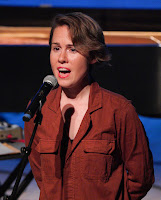 |
| Caroline Shaw. |
All of this, together with orchestral writing that went from something like Wagner’s Das Rheingold prelude, churning around a single note, to sudden patches of string pizzicati, to smudged up-swirls à la Beatles’ A Day in the Life, to anguished stacks of chords that refused to resolve, gave the impression of a composer searching for a way forward and throwing everything she could think of at a wall in the hope that something sticks. In its latter stages, however, Music in Common Time did achieve a sort of calm resolution, with actual words (author not credited) sung with hushed tenderness by the Chorale, that earned it warm applause.
Neither of the two shorter pieces, The Quickening (2022) by London-born Tarik O’Regan (b.1978)—a commission by the Pacific Chorale to open the concert—nor Frank Ticheli’s Until Forever Fades Away (2018), were Whitman settings, but their poetic texts, respectively by the Southern Californian poet Marcus Omari and Ticheli himself, both shared the Yankee master’s visionary spirit, alive alike to the ephemeral and the eternal, meditations on the essence of human experience interacting with the natural world.
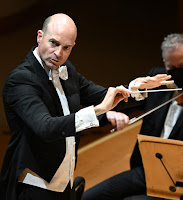 |
| Robert Istad. |
Until Forever Fades Away was more muscularly developmental. Somber lower strings ushered in first male, then female voices in undulating waves before arriving at a strong unison, precipitating a sudden acceleration driven by rapid chanting of “go, go, go” and slightly minimalist string chugging. But this soon retreated into a tranquil affirmation (“But wisdom sees a light draw near”), and finally to soft Holstian bitonal clashes before fading away into the empyrean.
Vaughan Williams’ cantata for soprano and baritone soloists, chorus, and very large orchestra with organ, Dona Nobis Pacem, was written in the shadow of, and as an implicit warning about, the rise of Nazism. A veteran of World War 1, he had first-hand knowledge of war horrors, but in Dona Nobis Pacem he produced a masterpiece that far transcends mere polemic, being at once a plea, a warning, a call to arms if needed, a lament, and a vision of hope and transcendence.
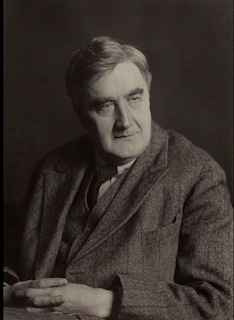 |
| Ralph Vaughan Williams in 1936. |
Aside from a passing regret that the Pacific Symphony strings were reduced by a few desks from their full strength, Robert Istad and his forces rose to the considerable challenge of presenting Dona Nobis Pacem with its full expressive range intact, from the anguished appeal by the soprano in the opening Agnus Dei (Deanna Breiwick’s voice having just about the ideal combination of strength and clarity, with a touch of more vulnerable “pure” tone) to her quiet reappearance, the plea for peace unchanged, at the conclusion of the radiantly optimistic sixth movement, O Man, Greatly Beloved, some 35 minutes later.
 |
| Dashon Burton. |
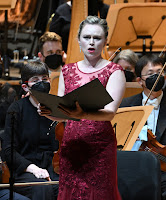 |
| Deanna Breiwick. |
Then at the heart of the work, came RVW’s magnificently processional setting of Whitman’s Dirge for Two Veterans, given its full weight, at once lamenting and celebratory, by the Pacific Chorale and Symphony Orchestra under Dr. Istad's authoritative baton. Remarkably, Dirge for Two Veterans was originally written in 1914 and incorporated into Dona Nobis Pacem 22 years later, yet without the slightest sense of stylistic incongruity.
John Bright’s words at the start of movement V “The Angel of Death has been abroad throughout the land”—and indeed the whole work—had, of course, a contemporary relevance that Dr. Istad could not have foreseen when he planned the performance, the first-ever of Dona Nobis Pacem by the Pacific Chorale, before the onset of the Covid pandemic. As it was, the appearance of the colors of the Ukrainian flag across the supertitle screen at the conclusion of this refined but urgent account of Vaughan Williams’ great work was a final underlining of that relevance. “Give us peace”, indeed.
---ooo---
Pacific Chorale, Renée and Henry Segerstrom Concert Hall, Costa Mesa, 5:00pm, Saturday, May 7, 2021.
Images: The performance: Doug Gifford for Pacific Chorale; Walt Whitman, Caroline Shaw, and Ralph Vaughan Williams: Wikimedia Commons.


No comments:
Post a Comment
Note: Only a member of this blog may post a comment.